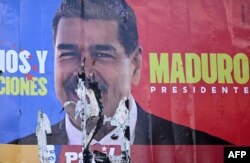Venezuela’s President Nicolás Maduro said he asked the country’s Supreme Court to conduct an audit of the presidential election, after opposition leaders disputed his claim of victory and amid international calls to release detailed vote counts.
Maduro told reporters Wednesday that the ruling party is also ready to show the totality of the tally sheets from Sunday’s election.
“I throw myself before justice,” he said to reporters outside the Supreme Court’s headquarters in Caracas, adding that he is “willing to be summoned, questioned, investigated.”
This is Maduro’s first concession to demands for more transparency about the election. However, the Supreme Court is closely aligned with his government; federal officials propose the court’s justices, and they are ratified by the National Assembly, which is dominated by Maduro sympathizers.
Maduro’s main challenger, Edmundo González, and opposition leader Maria Corina Machado, say they obtained more than two-thirds of the tally sheets that each electronic voting machine printed after polls closed. They said the release of the data on those tallies would prove Maduro lost the election.
Maduro insisted to reporters that there had been a plot against his government and that the electoral system was hacked, but he didn’t give any specifics or present any evidence. He is expected to address national and foreign media Wednesday afternoon, his first official news conference since the election.
Pressure has been building against the president. The National Electoral Council, which is loyal to his United Socialist Party of Venezuela, has yet to release any printed results from polling centers as it did in past elections.
Maduro’s close ally, Colombian President Gustavo Petro, on Wednesday joined other foreign leaders in urging him to release detailed vote counts. A day earlier, another Maduro ally, Brazilian President Luiz Inácio Lula da Silva, along with U.S. President Joe Biden, called for the “immediate release of full, transparent and detailed voting data at the polling station level.”
Machado said the vote tallies the opposition has obtained show González received roughly 6.2 million votes compared with 2.7 million for Maduro. That is widely different from the electoral council’s report that Maduro received 5.1 million votes, against more than 4.4 million for González.
Petro proposed that Maduro’s government and the opposition reach an agreement “that allows for the maximum respect of the [political] force that has lost the elections.” The agreement, he said, could be submitted to the United Nations Security Council.
Venezuela has the world’s largest proven crude reserves and once boasted Latin America’s most advanced economy, but it entered into free fall after Maduro took the helm in 2013. Plummeting oil prices, widespread shortages and hyperinflation that soared past 130,000% led to social unrest and mass emigration.
More than 7.7 million Venezuelans have left the country since 2014, the largest exodus in Latin America’s recent history. Many have settled in Colombia.
Speaking to reporters in Vietnam on Wednesday, the European Union’s foreign affairs chief said the bloc won’t recognize Maduro’s claim of electoral victory without independent verification of voting records.
The Carter Center, an independent U.S.-based institution that evaluates elections, said late Tuesday it was unable to verify the results of Venezuela’s presidential election, blaming authorities for a “complete lack of transparency” in declaring Maduro the winner without providing any individual polling tallies.
The group was authorized earlier this year by Venezuela’s electoral authorities to send experts to observe the election. It had 17 experts spread out in four cities on Sunday.
Within hours of the electoral council announcing Monday that Maduro had won, thousands of protesters took to the streets of the capital, Caracas, and other cities. The protests, which continued into Tuesday, turned violent at times, and law enforcement responded with tear gas and gun pellets.
Attorney General Tarek William Saab on Tuesday told reporters that more than 700 protesters were arrested in nationwide demonstrations Monday and that one officer was killed.
The Venezuela-based human rights organization Foro Penal also on Tuesday reported that 11 people, including two minors, had been killed in unrest related to the election.
Maduro’s closest ruling party allies quickly came to his defense. National Assembly President Jorge Rodriguez — his chief negotiator in dialogues with the U.S. and the opposition — insisted Maduro was the indisputable winner and called his opponents violent fascists.
Praising the arrests of the protesters, he said Machado should be jailed and so should González, “because he is the leader of the fascist conspiracy that is trying to impose itself in Venezuela.”
Meanwhile, Machado and González urged their supporters to remain calm and avoid violence.
“I ask Venezuelans to continue in peace, demanding that the result be respected and the tally sheets be published,” González said on X. “This victory, which belongs to all of us, will unite us and reconcile us as a nation.”



